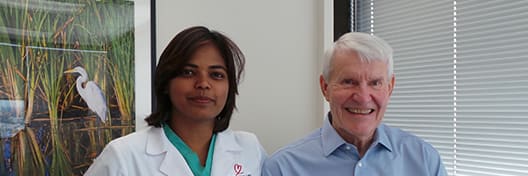“Magic stitch” and twilight sleep puts spring back in Joe Cawley’s step

Minimally invasive heart valve replacement speeds recovery, with fewer side effects.
Married almost 50 years in June, Joe Cawley and his wife, Margie, enjoy taking long walks and doing water aerobics several times a week.
But Cawley, 74, started feeling tired and short of breath early last year. In May, when he was in Baptist Medical Center South for a gastrointestinal procedure doctors determined he needed his heart valve replaced.
He turned to Baptist Heart Specialists. His cardiologist Shannon Leu, MD, referred him to Ruby Satpathy, MD, interventional cardiologist and director of the Structural Heart program at Baptist Medical Center Jacksonville.
There were two options: open heart surgery to replace the damaged valve, or a minimally invasive procedure known as Transcatheter Aortic Valve Replacement, or TAVR. But given Cawley’s age and other chronic conditions, the heart valve team decided he would be better served with TAVR.
The procedure is designed for people with severe aortic stenosis (narrowing of the aortic valve) who are high and intermediate risk candidates for open heart surgery. Performed through the femoral artery in the groin, TAVR allows physicians to replace the aortic valve without opening the chest and without using a heart-lung machine.
Cawley was the first patient in November to have TAVR performed without general anesthesia. Dr. Satpathy uses conscious sedation or twilight sleep similar to what is used for colonoscopies, endoscopies and heart catheterization procedures.
Conscious sedation allows patients to recover more quickly as opposed to general anesthesia where they are intubated and on a breathing machine.
“Patients are very comfortable. It’s just like going to sleep and waking up,” Dr. Satpathy said. “Patients don’t have the side effects of anesthesia and are not sleepy afterwards and they are walking four to five hours after surgery.”
Cawley, who has had other back and joint replacement surgeries, said he liked the idea of not being on general anesthesia.
“I thought if I didn’t have to have all that anesthesia running through my system, I said, ‘I’m game, let’s do it,’” Cawley recalled. “It was the most fascinating thing I’ve ever experienced in my life other than my wedding 50 years ago and the subsequent birth of our two daughters. I was even conversing with the anesthesiologist. I didn’t feel anything and I went home the next day.”